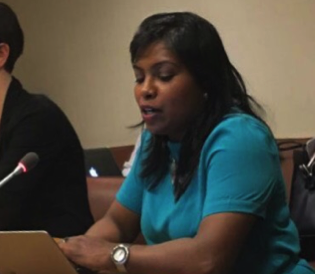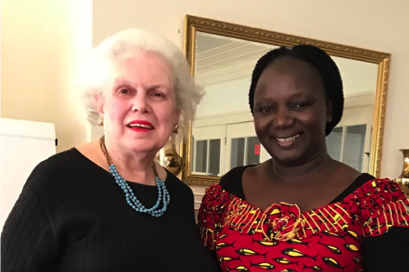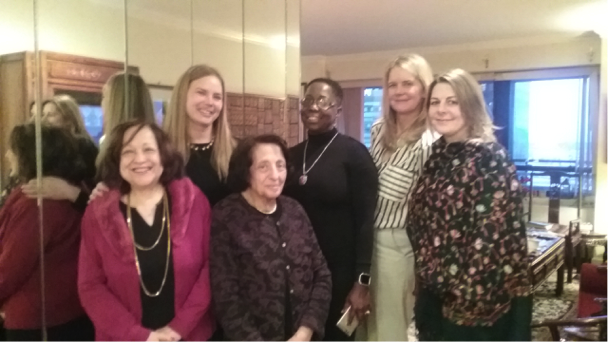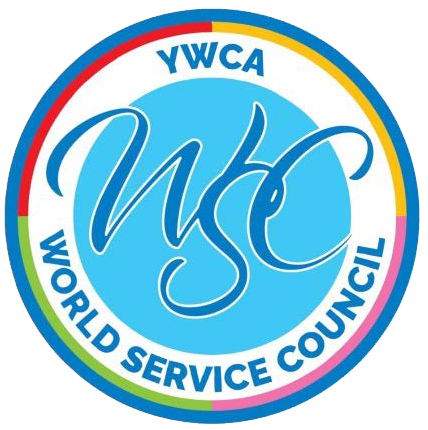Snowy fields surrounded the UN buildings this past week in New York as the 61st annual Conference on the Status of Women known as CSW opened for two weeks with over 5000 women attending. New Yorkers were busy after the second day brought a heavy snowstorm that left all the streets piled with snow along the curbs and slippery sidewalks. Building owners either shoveled or spread salt and the resulting mixture turned to ice every night for some ten days. Meanwhile, the city was mostly unaware of the human drama also playing out as women from over 140 countries managed to attend some of the 600 seminars and workshops that were presented at the UN and nearby buildings. Getting to this country was a costly effort for most of them, but the human, feminist effort was even greater for many as they managed to leave home and join with others to plead for women’s rights in another massive effort to end violence and inequality.
Sarah Arumugam

The World YWCA had several heroines among the 120 who attended this year’s session, but for those who met the group, there were some special stars. One was a woman from Sri Lanka named Sarah Arumugam, who is a prominent woman lawyer in her country, a member of the Sri Lanka YWCA, and board member of her local association. She has attended three other CSW conferences in past years and feels that the delegates she meets and connections she makes are worth the heavy expenses and difficulty in coming. Sarah made several calls to friends in the USA to see if she could get help on the costs and when she knew that she had her nights covered by guest beds and one hotel, there she was, speaking at several seminars and sharing valuable lessons on her work for peace.
Her message was a graphic but difficult one – about the fight for women’s rights and human rights in a country that ended a 30-year period of war seven years ago and still needs to make peace. In a major seminar entitled “Human rights, Gender, and Preventing Violent Extremism” on the second Monday, where she was one of two main speakers, she urged that countries like her use transitional justice mechanisms as a way forward for peace and reconciliation. To simplify the story of Sri Lanka, it is a country of 21 million, about half the size of New York state, with some 70% in the Buddhist, Sinhales, majority as well as 12% belonging to a minority group of Tamils and 12% being Muslims. Sri Lanka was ravaged by a long-running and bloody civil war due to ethnic tensions between the Sinhalese Majority and the Tamil minority. The conflict was militarily resolved in May 2009, costing the lives of an estimated 80,000 to 100,000 citizens, and hundreds of thousands of civilians who were displaced. Although the war ended then, ethnic division remains entrenched, and human rights abuses still prevail with root causes yet to be addressed
Sarah was asked whether Sri Lanka had received any help from South Africa with its widely praised and successful program of “Truth and Reconciliation.” Her answer was not surprising – a partial yes, but that all countries have different racial categories, and special answers must be created to fit. Other questions involved the dominant role of men in war, and the violence, abuse and misuse of women during wartime and after. Also, some 65,000 citizens are still unaccounted for, having been “disappeared,” and Sarah says that this tragedy of abuse must be solved before there can be any true reconciliation and progress.
Sarah herself has had a long history with the YWCA in her country, serving as an executive vice-president and currently as a member of her local Board. When we asked her how this role affected her reconciliation work, she said that it gave her enormous knowledge of the drastic results of war that had caused rape, violence, and dislocation for hundreds of women and the general population. She said that the women in her country are constantly trying to find the whereabouts of their loved ones while also working for peace with justice.
After a lengthy session with other speakers discussing core problems of war, violence and how to make peace – including in similar countries such as Afghanistan and Sudan – we learned that Sarah would also be meeting with the UN Human Rights commission that will visit Sri Lanka on Match 30th to try to help the country of Sri Lanka to survive. We were impressed by the efforts of the 30 or more skillful attendees who worked on the critical issues the group raised. And we ended by wishing them all a large portion of luck and success in this effort to bring peace and a better future to this one country out of so many that are struggling for women’s progress and human rights.
The second star of the CSW this past week for many of us was a mother of five from Yambio, South Sudan, a new country that became independent in July 2011, after 25 years of civil war. This woman’s name is Modi Mbaraza who still carries the title of Executive Director of YWCA of South Sudan although she is currently living in Uganda. Modi told some of us that she started the YWCA in her country in 1997.
Modi Mbaraza:

The YWCA of Yambio became affiliated with the World YWCA in July 2007 at the World YWCA Conference that was held in Nairobi, Kenya. The Union Congregational Church of Upper Montclair, New Jersey (UCC), the home church of Joyce Mims, longtime former Chair of the World Service Council, covered the registration fees and travel costs for 10 delegates. Fifteen attended, traveling by land for six days. One day they went only two miles because flooding had dislodged land mines.
Joyce Mims and the Rev. Dr. Stephanie Weiner, senior minister of UCC, soon established a relationship with the YWCA women of Yambio. For several years, the church supported year-long English classes for 60 women.
The church, in cooperation with the YWCA of Norway and Y-Global, also developed plans for a Health and Nutrition Center. $30,000 was allocated for a Nutrition Center and Literacy Classes. Now in Maridi, there is both a nursery school and a feeding program, and there are classes for more than 700 pupils. Today, the YWCA of Yambio has eight branches.
Modi’s first and only other UNCSW visit was in 2010. This year’s visit to the UN CSW has been very different – due to tragic and disheartening events. Her husband had started working for the new government of South Sudan in 2015, and was opposed to the rebel groups fighting there in their attempt to take over the country. He was surprised and killed by the rebels in an ambush on his way home from a government meeting. The YWCA of Norway, which had become interested and was supporting Modi and her YWCA, was so alarmed that it sent an immediate plane and managed to fly Modi and her five children out of the country. They were taken to safety in the neighboring country of Uganda where Modi still lives today. But, sadly, her life is closer to that of a refugee. She cannot obtain a work permit, nor can her 22-year-old daughter. Only three of the remaining four children attend school. As she told us, she barely has the funds to keep the family going, even with Norwegian and other help.
Yet Modi’s spirits are still amazingly high, and she attended several sessions at the UN before leaving to go visit a minister brother’s friend, who lives in Chicago. She also is working as a volunteer at the YWCA of Uganda and hopes to connect with some Ugandan friends of Jill Sen’s and Michaela Walsh’s who run clinics and agencies in that much safer country. When we asked Modi about her work with the YWCA there in both South Sudan and Uganda, she was full of determination to win the struggle for women’s rights, including their education, economic empowerment and basic freedoms. As she said to a couple of us while eating at the communal Hotel Affinia in the city, she herself was innocently trapped into sex and marriage at a young age in return for someone paying for her education, and she is determined not to have such a practice of childhood marriage continue for her children’s generation – or other injuries to women.

On the other hand, Modi is deeply concerned about the future of her country, and sees disaster for millions there if the world doesn’t come to their aid with food or military assistance. While we saw her before CBS produced its March 19th dramatic program on 60 Minutes about famine conditions in South Sudan, the picture has been clear enough to all at the UN this past session. Then threats of the current Trump administration to cut vast amounts of foreign aid have only made the picture more grim for all the delegates at this CSW conference.
Our two heroine women with their espousal of higher education and a positive future for all women in their countries were a striking example of how women today – even those living under drastic war conditions – are hoping, and working, for a new kind of future for others of their gender. The fact that they made it at all to the USA and the UN to fight for better conditions was truly inspiring to those who met them, and their fighting spirit was a further inspiration.
Two younger women, one from Samoa and one from Kenya, also spoke at the YWCA USA-World Service Council reception about climate change and reproductive instruction in their own countries. And while each woman fought back tears, they brought the same message of determination and courage. Those of us in the World YWCA and working at the UN were grateful to have the experience of getting to know these women. We also had to cheer them on for all that they brought to the cause for women and all they taught the rest of us about optimism, cheer, determination, and resolution for the days and uncertain future that lies ahead.
Connie Tate, March 2017
